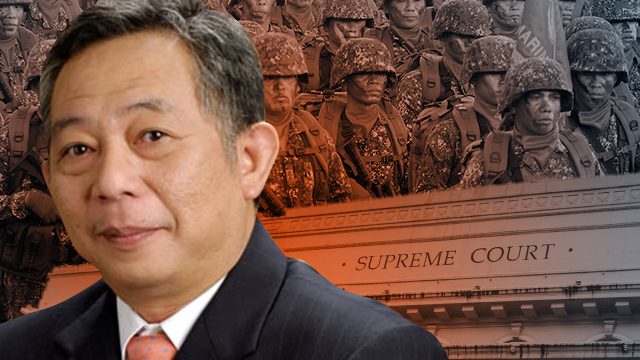SUMMARY
This is AI generated summarization, which may have errors. For context, always refer to the full article.

MANILA, Philippines – Supreme Court Associate Justice Benjamin Caguioa said that his colleagues had set a dangerous precedent when they recognized that the conflict arising from the communist insurgency can be basis to declare and extend the imposition of martial law.
“This precedent dangerously supports the theoretical possibility of perpetual martial law. This precedent dangerously suggests a perpetual violation of people’s constitutional rights,” Caguioa said in his dissenting opinion on the SC decision declaring as constitutional the re-extension of martial law in Mindanao to end-2018.
Caguioa is one of the dissenters in the landmark 10-5 ruling, which gave Congress the discretion to decide the frequency and duration of a martial law extension. (READ: SC ruling: ‘Martial law ad infinitum’ and a ‘tragic repeat of 1972’)
In the majority ruling written by Associate Justice Noel Tijam, President Rodrigo Duterte’s first appointee to the SC, the Court said that it was reasonable for the President to include the NPA “rebellion” as grounds to extend martial law.
“The NPA’s ‘intensified’ insurgence clearly bears a significant impact on the security of Mindanao and the safety of its people, which were the very reasons for the martial law proclamation and its initial extension,” Tijam wrote.
The NPA, the armed wing of the Communist Party of the Philippines (CPP), was established in 1969. The armed struggle of the CPP-NPA is Asia’s longest-running communist insurgency.
“In this scenario espoused by the ponencia, violent attacks by different armed groups could easily form the basis of an endless chain of extensions, so long as there are ‘overlaps’ in the attacks,” Caguioa said.
Caguioa said that it was vague to claim that the NPA’s rebellion intensified, when the rebellion has existed for decades. Caguioa, an appointee of former president Benigno Aquino III, said that Duterte’s letter to Congress did not provide a standard by which to measure whether there was indeed a rise in violent incidents that would merit martial law.
“Without such standard, Congress will be left to guesswork and blind adherence to the word of the President,” Caguioa said.
In his dissenting opinion, Associate Justice Marvic Leonen – also an Aquino appointee – said that statistics would suggest there was no intensification.
“The NPA is claimed to have amassed P1.05 billion in 2016 from private individuals and entities but their extortion activities appeared to have declined. The Armed Forces of the Philippines (AFP), however, reports that as of the first semester of 2017, the NPA has taken roughly only P91 million from private entities. This is a marked decline,” Leonen said.
Leonen said the AFP’s own statistics would prove that the military has had success in quelling the NPA conflict even without martial law.
Separate proclamation
Caguioa said that the imposition of martial law based on the communist insurgency needs a separate proclamation, therefore a separate justification whether it merits martial rule
Senior Associate Justice Antonio Carpio agreed.
Carpio said that the President and Congress “circumvented” the Constitution when the Chief Executive belatedly included the NPA in his request for extension. He explained that the original proclamation, which the SC earlier upheld, did not cite the NPA.
“To belatedly expand the factual basis of Proclamation No. 216 as to include the NPA rebellion will violate Section 18, Article VII of the Constitution,” Carpio said.
Chief Justice Maria Lourdes Sereno, for her part, said that for the government to prove that rebellion persisted in Mindanao, it can only cite the persistence of the Maute rebels, and not the NPA.
“The addition of a new actor as factual basis for arguing that a rebellion persists is self-contradictory and cannot be accepted,” Sereno said.
The 4 justices and Associate Justice Francis Jardeleza – who changed his vote from the ruling on the original proclamation – are the 5 dissenters. Carpio is the only non-Aquino appointee, as he was appointed by then President Gloria Macapagal-Arroyo in 2001. – Rappler.com
Add a comment
How does this make you feel?
There are no comments yet. Add your comment to start the conversation.